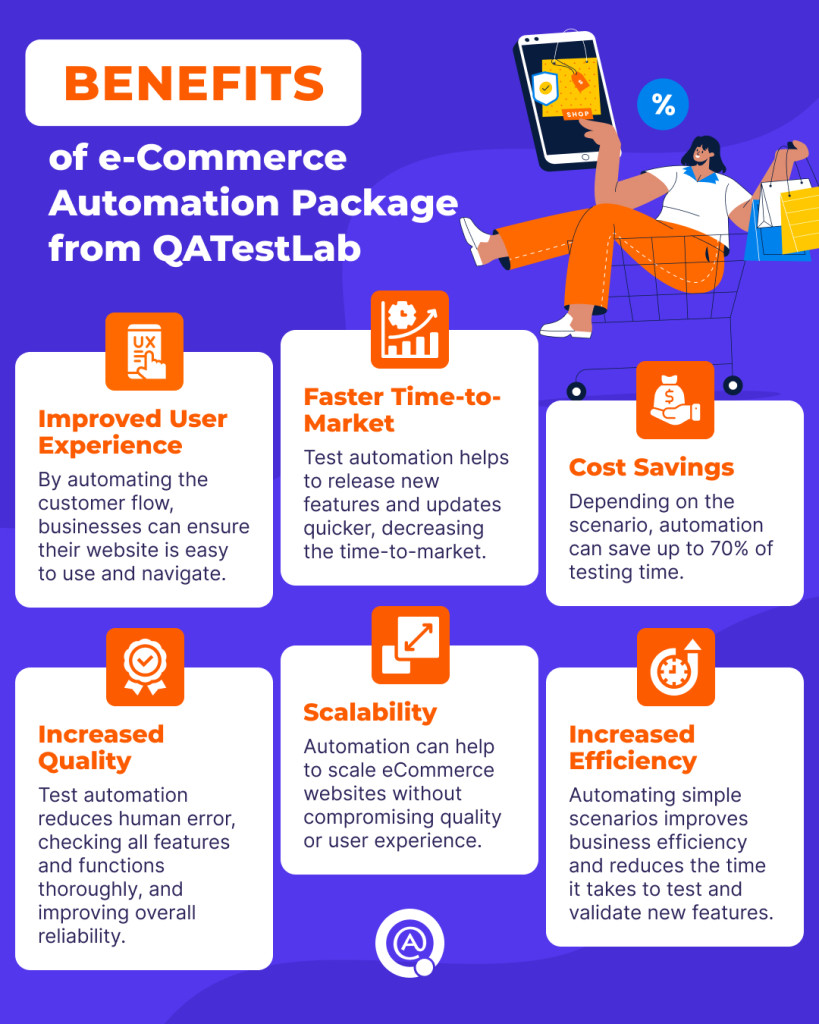How to Improve Your e-Commerce Product UX with QA?
by Diana Dovidna | April 5, 2023 6:21 am
User experience has proven to be the key to distinguishing good e-Commerce platforms from great ones. Retail websites and applications are constantly slammed by hundreds and thousands of visitors looking for something they need or want at this very moment.
At this point, the experience you provide your visitors with will determine whether they make a purchase on your website or move to another one. That is why businesses need to invest in the UX-focused approach to product development.
This is when User Experience testing comes into play.
What is UX testing for e-Commerce apps and websites?
UX testing is a process of evaluating a user’s experience when interacting with a digital product or service. It can include anything from user research and surveys to usability testing and A/B testing. [1]The goal of UX testing [2]is to identify any obstacles or pain points that users may encounter during their journey and to make improvements to create a better user experience.
Of course, bugs can happen and even exist for years, unnoticed by visitors. People may forgive you a minor inconvenience like a broken link on some product page. However, search issues and troubles with checkout, ordering, and payment affect online sales greatly.
When setting the goals of your own e-commerce UX test, keep these two questions in mind:
- Can users quickly find what they want?
- Can users make a purchase frictionlessly?
And the results of this focus speak for themselves.
Each dollar invested in user experience generates $100 in return, according to a Forrester Research Report[3].
And, of course, you have probably heard great success stories like this when such a simple step, like changing the text on the CTA button, gained a whopping $300 million in sales for a company in just a year. A deep focus on UX also pays off for the business’s reputation. Have you seen our recent case study[4] on how the app rate on Google Play jumped from 3.5 to 4.2 after UI/UX testing? Users will always appreciate the effort companies put into UX.
Our Approach to UX Testing for e-Commerce platforms
To check whether the solution meets user expectations, we apply two approaches for user experience testing:
- qualitative methodology to detect major issues based on product design;
- quantitative testing to check the consequences of changes and product redesign.
We check different product characteristics from the perspective of both newbies and experienced users. The testing process involves the evaluation of product efficiency, ease of learning, system accuracy, and failure rate to provide our clients with an unbiased analysis of product usability.
By gathering and analyzing user experience under real conditions, we perform usability tests on-site and examine the user working environment. On-site observations provide an objective evaluation of system usability at a lower cost.
At QATestLab, we understand that in the highly competitive world of e-commerce, time is everything. To provide our clients with a solution that can reduce the time for testing, we introduce our Test Automation Package developed especially for e-Commerce products.
It includes three different options, categorized by the automated testing functionality and the post-testing support period. This way, you can choose the variant that suits your needs and budget best.
 [5]
[5]Benefits of e-Commerce Automation Package from QATestLab
Improved User Experience
By automating the customer flow, businesses can ensure their website is easy to use and navigate. This leads to an improved user experience and reduced bounce rate, which ultimately results in higher sales.
Faster Time-to-Market
Test automation helps to release new features and updates quicker, decreasing the time-to-market and enabling them to stay ahead of the competition.
Cost Savings
Automation allows companies to save time and money by streamlining repetitive tasks, reducing the need for manual testing and maintenance, and improving overall efficiency.
Depending on the scenario, automation can save up to 70% of testing time.
Increased Quality
Businesses can improve website quality through test automation by reducing human error, testing features and functions thoroughly, and improving overall reliability.
Scalability
Business owners can use automation to scale their websites and handle higher volumes of traffic and sales without compromising quality or user experience.
Increased Efficiency
By automating simple scenarios, companies can improve their efficiency and reduce the time it takes to test and validate new features and updates.

Conclusion
UX testing is critical for e-commerce platforms looking to provide a seamless and enjoyable shopping experience for their customers. By improving conversion rates, increasing customer loyalty, reducing cart abandonment rates, enhancing brand reputation, and saving time and money, UX testing is a valuable investment for businesses looking to stay competitive in the ever-evolving world of e-commerce.
Contact us[6] today for more information about the testing services we provide for e-Commerce solutions. Let’s strive for the best quality of your product together.
Learn more from QATestLab
Related Posts:
- : https://qatestlab.com/resources/knowledge-center/usability-testing-goal/
- The goal of UX testing : https://qatestlab.com/resources/knowledge-center/usability-testing-goal/?utm_source=blog&utm_medium=article&utm_campaign=ux-testing-ecommerce
- Forrester Research Report: https://www.forrester.com/report/The-Six-Steps-For-Justifying-Better-UX/RES117708
- recent case study: https://www.linkedin.com/posts/qatestlab_case-study-real-estate-software-qatestlab-activity-7040966459027566592-ymy6?utm_source=share&utm_medium=member_desktop
- [Image]: https://qatestlab.com/request-a-quote/?utm_source=blog&utm_medium=article&utm_campaign=ux-testing-ecommerce
- Contact us: https://qatestlab.com/request-a-quote/?utm_source=blog&utm_medium=article&utm_campaign=ux-testing-ecommerce
Source URL: https://blog.qatestlab.com/2023/04/05/ecommerce-ux-testing/

